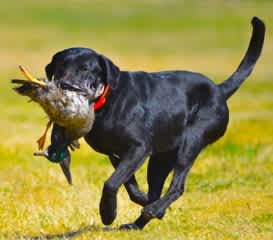Seven Tips about Retrievers
Quick Dog Productions LLC 11.16.12

Retrievers are the best companions on the planet. They are loyal, often protective, really smart and easy to train because they love food. There are many types of retrievers, from the smaller Nova Scotia Duck Tolling retriever to the more familiar Labrador and Golden. But what they all have in common is that they love to work and play. Here are 7 more tips you should know about retrievers.
- A retriever is a gun dog. But they also are keen working dogs for competitions or obedience events. Retrievers are so versatile, in fact, that they have become a standard in emergency rescue operations. Before you run out and buy a retriever puppy, ask yourself why you are buying it. If the dog is for a child or grandparent maybe you would be better off with a Tolling retriever, which is a lot easier to handle than a 75-90 pound Labrador. If you do a lot of waterfowl hunting, any retriever will do. I’ve seen plenty of small Tolling retrievers pick up birds twice their size! They all have an innate ability to retrieve, but asking the dog to fetch your downed birds still takes lots of training and a good pedigree.
- Unlike some breeds, all retrievers love to play hard. That means they need daily exercise, especially when they are young. Retrievers love nothing more than to jump, run and swim. Before you start exercising your dog though, check with your vet first to ensure that your dog is healthy enough for a robust program. This is critical if you plan on hunting with the dog.
- To keep them healthy all year round get involved in planned dog programs that offer agility, obedience or competition, whether that’s through a community program or a professional outfit. The simplest way to exercise your dog is to play a simple game of fetch in an open field, but it only starts there. Try joining a local AKC or HRC club of like-minded owners because there are all sorts of activities nearly every weekend where your dog can get loads of exercise and some solid field training.
- Never over-exercise a retriever. Dogs in general have sweat glands in their paws so use caution and never walk on hot concrete or asphalt. If you live in the city, the best time for a stroll is early in the morning or late in the afternoon when the temperatures are mild. Also, if you do a lot of hiking in extremely rough or cold terrain, dog booties offer added paw protection. Always bring enough water for you and the retriever to avoid dehydration. Just because you can hike 10 miles without a break, doesn’t mean your retriever can do the same. Dogs can’t tell you they are dehydrated. Always pack enough water on any hike.
- Temperaments are the thing that separates one retriever from its closest cousin. Labradors can be much more friendly to strangers than Chesapeake Bay Retrievers, who tend to be a one-person dog. But even within the same breed individual dogs can vary in temperament. That’s why it’s vital to know the history of the dog you are about to take home.
- Adopting a retriever mix from a shelter can be a good thing. The same applies to buying a purebred from a breeder. However, shelters typically don’t know the bitch or sire, and it gets even more confusing if the dog is a mix breed. Whereas a good retriever breeder can tell you everything you need to know about their puppies. Not knowing the history of the dog prevents you from understanding its level of aggression or medical history. Rescuing a retriever is a thoughtful and respectful thing to do. But do your research first.
- A good rescue facility will always try to match you with a dog that can live peacefully in your family. And a good breeder will always produce certification attesting to the dog’s overall health, especially its hips and eyes. Just understand that no two retrievers are the same. Like people they have personalities that can greatly differ when aroused. My best advice is to learn as much as possible about the dog before you decided to welcome him or her into your home.

